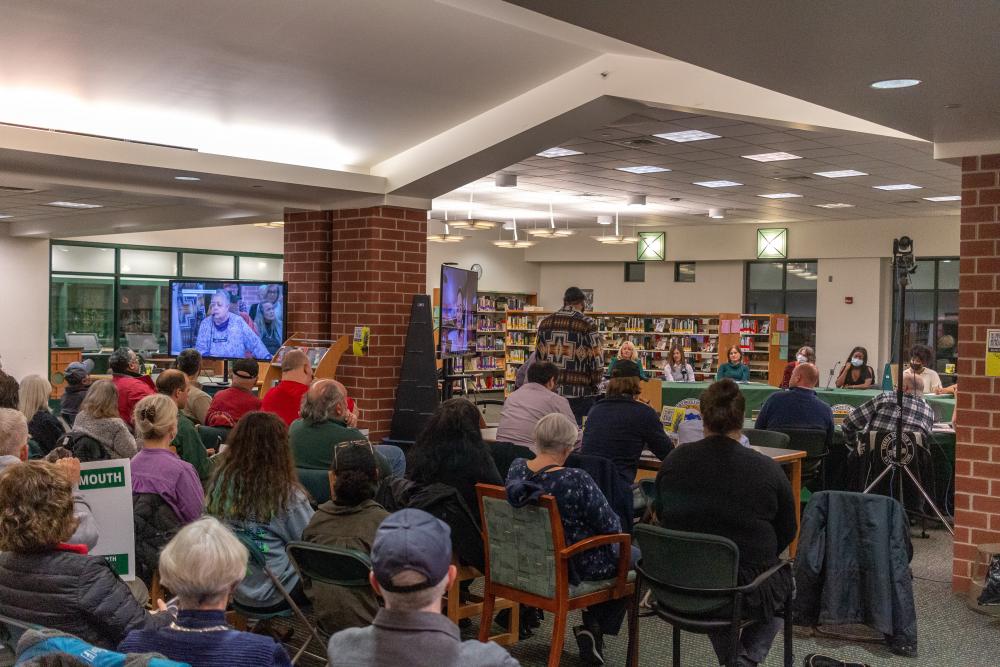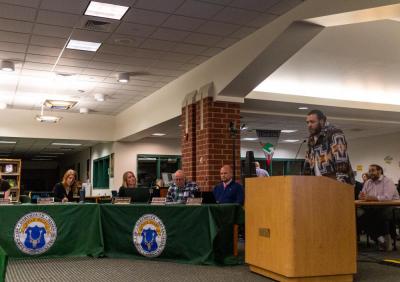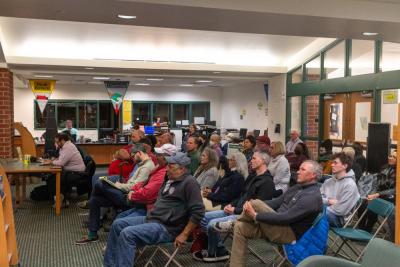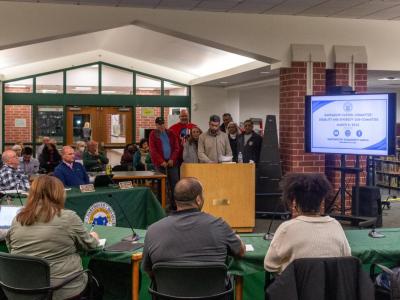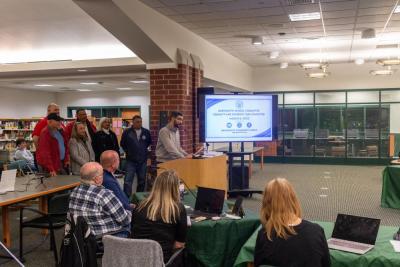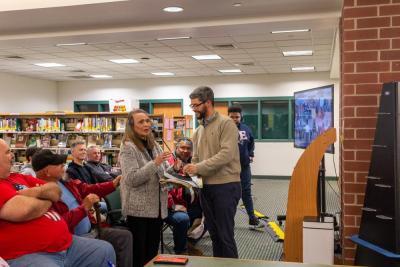Tribal members provide input on high school logo at public forum
As debate over Dartmouth High’s Indian logo continued at a Tuesday evening forum, some tribal representatives spoke about the pain of having their culture reduced to a single warrior image, while others said they are proud to have a logo that accurately depicts their ancestors.
Organized by the Dartmouth School Committee and its Equity and Diversity Subcommittee, the gathering was designed to allow Native Americans to have their say in advance of a March 22 forum for the general public and an April 5 non-binding referendum.
The forum included speakers from the Mashpee Wampanoag, Wampanoag of Gay Head Aquinnah, the state-recognized Pocasset tribe, and the North American Indian Center of Boston.
Since the Aquinnah Wampanoag tribe has not taken an official position on the issue, speakers who were both for and against the logo had the opportunity to speak.
Brad Lopes, the program director for the Aquinnah Cultural Center, said he wanted to see the school’s name and logo abolished.
He recently started a Change.org petition to “Ban Native Mascots and End Dartmouth Mascot Support.” The petition currently has more than 50 signatures from various tribal members, Lopes said.
Lopes, a New Bedford native and current Maine resident, reached out to the School Committee to share his perspective and his experience at a school in Maine that also had an Indian logo that was deemed “historically accurate.”
“It didn’t stop it from being misinterpreted and used as a weapon,” he said.
According to the Aquinnah Wampanoag member, he was seen as “the dirty Indian” at his school.
“I was bullied excessively by my non-native peers,” Lopes said. “I was often subject to many taunts — I was often asked to be the mascot.”
“I am not a mascot, I am a human being,” he added.
Along with feeling the logo was offensive, Lopes said that keeping the Indian would also “damage relations with other indigenous nations across Massachusetts” and would hinder the school district from hiring instructors of color in the future.
His sentiments were echoed by Megan Running Deer Page, a council member for the Pocasset Wampanoag. Though not federally recognized, the Pocasset are the native tribe whose territory once included what is now Dartmouth and are recognized by the state, she said.
Page framed the debate as a moral issue that should be left to native people to decide, as it is their symbolism that is being used.
“Native people have longed for the day when we are no longer paraded around like mythical creatures, savages and aggressive warriors,” she said.
Page was clear that for her the issue was not a matter of politics or “woke culture” but about respecting the wishes of the very people that the logo seeks to glorify.
“It’s about how the logo makes the people it is supposed to honor and protect feel,” she said. “It does not make the majority of us feel that way.”
Meanwhile, Pocasset Tribal Chair George Spring Buffalo wrote to the School Committee in favor of the logo.
“Should we erase all presence of native peoples in an effort to stop discrimination?” he wrote.
Sean Carney, a New Bedford attorney and nephew of Aquinnah Wampanoag Tribal Chair Cheryl Andrews-Maltais, criticized the School Committee for not inviting his side to speak “until the 11th hour.”
“We were only informed late last night after the School Committee met,” Carney said.
The day before, 25 Dartmouth members of the tribe sent the committee a letter claiming that prior to the forum, they were not formally invited to speak — something school officials dispute.
The alleged snub also includes two current high school students who are also tribe members.
“How tragic would it be to our Dartmouth High students who are tribal members who are being stripped of their representative identity without ever having been consulted?” the letter read.
School Committee and Equality and Diversity Subcommittee Chair Dr. Shannon Jenkins noted that last month, school officials had sent emails to Andrews-Maltais and her assistant inviting them to participate on the panel.
“There was not an attempt to exclude the tribe,” she said. “I apologize if that was not communicated.”
Carney also reiterated the position that he and 24 other fellow Dartmouth members of the tribe have: keep the logo.
“The symbol and logo has united generations,” he said. “And it was designed by one of our own: Clyde Andrews.”
His grandmother Edith Andrews — who helped bring federal recognition to the tribe in 1987 — also provided her support for retaining the logo.
“It’s an icon,” she said, adding that the symbol is a way to showcase her ancestors who helped make the Massachusetts that exists today. “[I’m] thankful to be a Wampanoag people that helped the Pilgrims survive.”
Bear Heart, the Chair of the federally recognized Mashpee Wampanoag, spoke about the origins of the term “Indian” — stemming from Columbus’ misconception that he had arrived in India when he first reached North America — and asserted that its use is not accepted by most Native Americans.
“I don’t know how anyone else feels, but I know I’m not an Indian,” he said. “Some people might be okay with that, but the majority of us are not, and no individual speaks for an entire nation.”
Carney, meanwhile, said the phrase is “not derogatory.”
“It is codified in our constitution — which gives us our inherent rights,” he said. “By getting rid of ‘Indian,’ you might as well be getting rid of these rights.”
While the tribal members differed in their stances on the logo, all speakers agreed that the school district should incorporate more Native American history into its curriculum.
Carney welcomed collaboration with his tribe and the school district.
“This is a uniquely Dartmouth issue,” he said. “We would love that community-tribal government relationship. We would love to educate your students.”
According to Superintendent of Schools Dr. Bonny Gifford, talks are currently ongoing with the Aquinnah Wampanoag tribe on what that curriculum should look like.
Currently, indigenous history is taught primarily in the third grade.
“We’ve had good conversations,” she said.
The March 8 forum was the first of two planned discussions. The second, set for March 22 inside the high school auditorium, will focus on how Dartmouth residents feel about the name and logo.
All members of the public are invited.
As controversy over the Dartmouth High Indian logo continues, Dartmouth’s voters will get to have their say in a non-binding referendum in the upcoming town election on April 5.
The referendum is ultimately a measure of public opinion, as the vote is non-binding. The School Committee has the final say on the logo’s fate.



